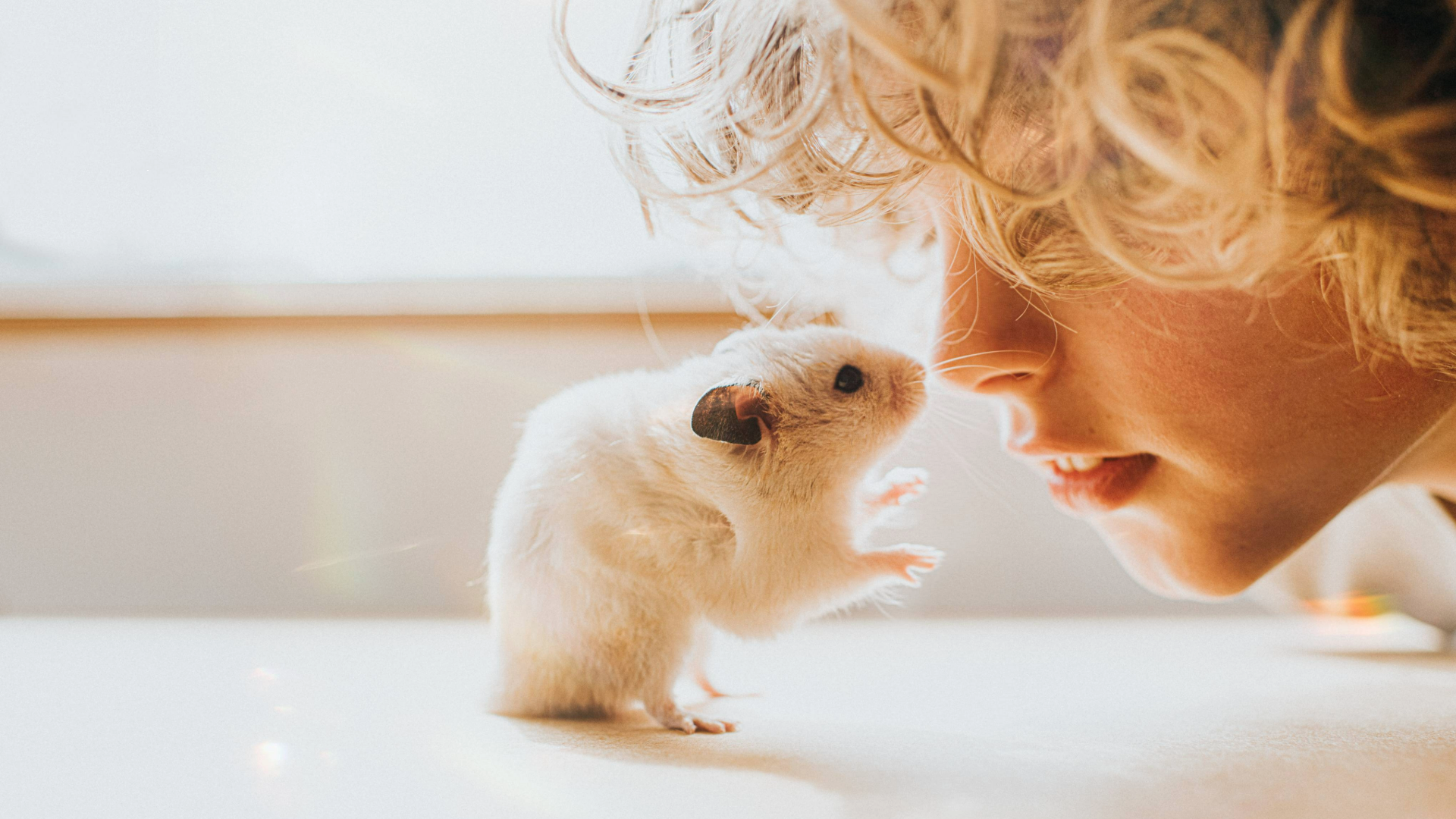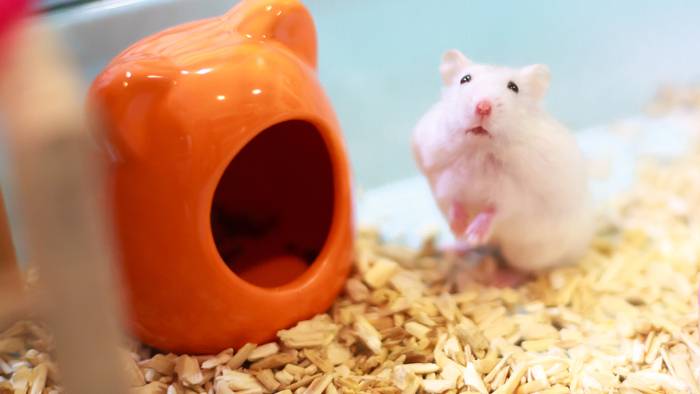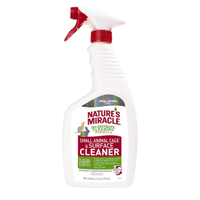Do hamsters smell? Yes, but here are 3 vet-approved ways to get rid of bad odors
An expert answers, ‘Do hamsters smell?’ and shares her top tips for reducing unpleasant aromas.

Do hamsters smell? Like all animals, the answer is yes. While it’s impossible to stop your hamster from smelling altogether, there are a few ways to reduce unpleasant odors, like regularly cleaning their cage and removing any rotten food from their environment (which is important to do anyway).
This might come as a surprise, but hamsters are actually very clean creatures and will wash themselves throughout the day. In the wild, they try to keep their scent to a minimum to avoid being hunted down by predators who might sniff them out.
If you’ve provided your furry friend with one of the best hamster cages and kept it clean, there may be other reasons they smell: they could be unwell, in heat, sexually excited, or marking their territory. To get to the bottom of this problem, we’ve asked vet Dr. Rebecca MacMillan for her expert advice below.
How do you get rid of hamster smell?
1. Regularly clean out their cage
If your hamster's cage and bedding have a build-up of urine, this can lead to a problematic pong. Hamsters will choose to urinate as far from their sleeping area as possible, both because they have sensitive noses, and to stop predators finding their hideout.
Regular cage cleaning will reduce this odor, so provided you are willing to put the effort in, you can keep the smells emanating from your furry pal's cage to a minimum.
When it comes to cage cleaning, you need to balance this so as not to disturb your hamster too much. Hamsters can get scared when removed from their cage too often, so it is worth creating another fun place for them to be while you clean their home.
A thorough complete bedding change and deep clean using hamster-friendly disinfectant once a week is about the right balance between making hammy and your nose equally comfortable. You can see more on this in our guide on how to clean your hamster's cage.
Nature's Miracle Small Animal Cage & Surface Cleaner | Amazon
To keep your hamster's cage clean and hygienic, you’ll need to invest in a high-quality cleaner like this one. It has a bio-enzymatic formula that breaks down stains and odors without leaving behind any strong smells.
Dr. MacMillan says: "To keep your hamster's cage smelling sweet you should spot clean it daily. Many hamsters will toilet in one or two specific areas of their enclosure, so you should be able to scoop out soiled bedding easily."
You can make this easier for yourself by putting a small tray or litter box where they are already peeing. This can then be lifted out and cleaned very easily when they are sleeping in their hideout.
2. Check for signs of illness
Compared to their urine, excrement is less of an issue. It is usually dry and doesn't smell. If their poo is smelly and wet, this can be a sign that your hamster is unwell and a trip to the vet is in order. It can be a sign of 'wet tail', a common hamster illness.
3. Clean out any hidden food
Another cause of a smelly cage can be hidden food, according to Dr. MacMillan. Dry food won't smell unless it has got wet, but fresh food like broccoli and cabbage will rot producing unpleasant sulfurous odors.

Do male or female hamsters smell worse?
Both male and female hamsters smell, but for different reasons, so the question of which smells worse is a hotly debated topic. Female hamsters come into heat every four days or so and during this time they release a musky scent which some pet owners find reminiscent of burning rubber.
The amount of smell released depends on the species, with female Syrian hamsters particularly noted for their stronger acrid smell compared to dwarf hamsters.
Males will lick their scent glands when sexually excited to release more of their scent so females can find them. This again makes their scent a lot stronger than usual. They can also be more aggressive at marking their territory at certain times of the year, leading to stronger-smelling bedding. In this case, male dwarf hamsters are reported to smell stronger than male Syrians.
Dr. MacMillan adds: "You may find that male hamsters may have a muskier scent than females, but many people can’t tell the difference."
Should I give my hamster a bath?
It is not a good idea to give your hamster a bath in the traditional sense, or even get them wet. Water – especially soapy water – will strip them of the natural oils they have in their fur which are essential for keeping them warm. When wet they can get cold very quickly, and this can make them susceptible to illness. As such it is better to avoid water altogether. It will also cause them stress and you're likely to get nipped.
You can use a gently moistened tissue to remove ingrained dirt but only use it on the affected area and keep them somewhere warm for a few hours after. The only time that a hamster needs bathing is if they come into contact with something toxic or extremely sticky, according to Dr. MacMillan.
You can also provide them with a sand bath for them to roll around in to clean themselves more thoroughly. This will allow them to get clean in a way that they would in the wild. Ensure you are buying hamster sand not hamster dust though, as the smaller dust particles can cause respiratory disorders in your furry friend.
Pinvnby Hamster Sand Bath Box | Amazon
A sandbox is a must-have in every hamster’s cage, and this one includes a ladder and a small bowl. It’s free of nails and made from all-natural birch, which is non-toxic and safe for chewing. Just be sure to sand down the corners first!
Do hamsters smell more when they are frightened?
Anxious hamsters do tend to urinate more than relaxed ones, and this will cause them to smell more, says Dr. MacMillan. It may also cause them to spend more time marking their territory, which can increase odors.
Remember to interact with your hamster only gently so they don't feel they are being threatened. Also, be aware that strong perfumes or aftershaves will discomfort hamsters as they have a much more sensitive nose than you or I.
If you've got a stressed hamster on your hands, this vet's guide can help you.

Should I keep my hamster in my bedroom?
Provided you keep up a regular cage cleaning regimen you can keep a hamster in your bedroom. Try to avoid strong sunlight or drafts, which may cause your hamster's cage to smell more. However, remember hamsters are sensitive to noise and activity.
If your room is a busy place, you may distress your hamster making them more likely to urinate more. They can also detect ultrasound in a way we can't and many devices like televisions and other electrical devices produce these. Provided your room has a quiet corner away from these devices and other noise sources, there should be no issue with keeping hammy in the same room as you.
Do hamsters smell when they die?
Hamsters will start to smell after they die, but not straight away. The length of time this can take depends on the temperature of the room. In most houses, it will take three days before the smell becomes really bad.
Because of this, as sad as it may be, it is better to bury your dead hamster as soon as you discover them. It's important to wear latex gloves while doing this and dispose of all of their bedding and food, and disinfect their cage to ensure that you aren't exposed to any potentially harmful bacteria.
If your hamster is biting their cage, check out our vet’s helpful guide.

Rebecca is a vet surgeon who graduated in 2009 from the Royal Veterinary College in London. She has a wealth of experience in first opinion small animal practice, having done a mixture of day-to-day routine work, on-call emergency duties and managerial roles over the years. She enjoys medicine in particular and she is proud to have recently achieved a BSAVA postgraduate certificate in small animal medicine (with commendation). She writes on various feline and canine topics, including behavior, nutrition, and health. Outside of work and writing she enjoys walking her own dog, spending time with her young family and baking!
Get the best advice, tips and top tech for your beloved Pets

Megan is a Staff Writer at PetsRadar, covering features, reviews, deals, and buying guides. She has a wealth of experience caring for animals, having grown up with dogs, cats, horses, guinea pigs, and more throughout her life. She studied BA Journalism at the University of Westminster, where she specialized in lifestyle journalism and was editor of Smoke Radio’s lifestyle website. Megan works alongside qualified vets and accredited trainers to ensure you get the best advice possible. She is passionate about finding accurate and helpful answers to your pet-related questions.


